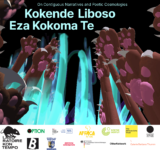Isabella Morris
“How to learn a Language” is the second and final story of a two-part prelude to Bakwa 08, the “Pain issue”. The first was Sturdy Man with Shaggy Beard by Ucheoma Onwutuebe.
The first thing the teacher writes on the board is:
“Step 1: Don’t Expect Miracles”
And hadn’t God taught Kamila that lesson? Had she not spent months staring at Fahad’s photograph expecting him to burst through the rectangle of glass in the frame and emerge, whole, warm, tender, breathing? A thousand prayers offered, a thousand candles lit, a thousand promises made in the tortured hours of night and a thousand more during the relentless hours of day; and then the desperate plea. If she could just have a minute more, even just a second with him, she would trade that eye-blink moment for the rest of her life. “It’s a good deal,” she said to God, and she repeated her request because she feared He might not have heard her through the breath that came thick and hot through her mouth.
The appeal to God was made during the bargaining stage; the phase when her mind simply refused to believe that she would never know the mouth-warm taste of Fahad again, never feel his toes find hers when they slipped beneath the sheets at night, never feel his hands across the space between her hips where he expected their child to grow. But God ignored the ache of her heart. Instead, her screams tortured the pillow where Fahad had lain his head, and He turned a blind eye to the way she picked holes in the places where Fahad’s hands used to touch her. She was so afraid that she would forget Fahad’s touch that she gouged out chunks of her flesh until she bled, and her patient, hand-wringing mother caught sight of the scabbed areas on her neck, where Fahad used to drop his kisses.
The sharp sting of iodine could not stop her self-inflicted wounds, and eventually, when the doctor could stand her mother’s anxiety no longer, he prescribed the pills that sucked every bit of colour from the world, so that she woke one morning to find herself in a black and white movie with a delayed soundtrack. During those anaesthetised weeks, she came to know that miracles were not real.
Kamila knows she can take this class, improve her English, and find something that excites her more than the perfumery where she should be working, but she hasn’t worked there since Fahad died. The teacher calls Kamila’s name and asks her if she can think of a strategy that will make learning English easier. The blush radiates across her face and down her neck and she wonders if she might need reading glasses, because she cannot read Step 2 on the board. Stay focussed, Kamila, she hears her brother Osama’s gentle voice become her own as she repeats his words to the English tutor. “Exactly, that’s an important thing to remember. You cannot hope to learn, to overcome your old mental blocks if you don’t focus on the task at hand. Take the lessons one at a time, be kind to yourselves, but be dedicated,” he says. Kamila expects the teacher to smile then, but he doesn’t, and she is so relieved that the redness in her cheeks subsides.
Kamila has discovered that there is a special smile for young widows, and she despises both the smile and the word that will remind her for the rest of her life that in an unforgiving minute God punished her and took Fahad away from her. The widow smile is a facial gesture of pity, hardened and rendered insincere by lips that do not show teeth, as if the showing of teeth is indecent. The widow smile is a gesticulation of fear given by women clinging to the arms of their own husbands, as if a stiff smile sacrificed to a widow will delay the summonsing of their own men to the afterlife. Sometimes Kamila has to draw her tongue over the top of her teeth because her own teeth and gums have fused since she stopped smiling.
The background noise has dissipated; Kamila’s eyes zoom out of the nightmare of widow smiles and zoom in on the teacher who is standing at the door, his finger poised on the light switch. They have both just noticed each other; it is a paused moment, a hiatus that concedes the awkward presence of each other. “I’m sorry, I thought everyone had left,” he says, and Kamila is on her feet and scuttling through the door, and she is so aware of herself that she can feel the rub of her sock between her boot and the arch of her foot. She is suddenly so conscious of herself as an entity that she dares not speak, for she is afraid of the sound of her own voice, afraid that she will not know it; and that if she does recognise it, its familiarity will restore brightness into her deserved darkness.
The sharp sting of iodine could not stop her self-inflicted wounds, and eventually, when the doctor could stand her mother’s anxiety no longer, he prescribed the pills that sucked every bit of colour from the world, so that she woke one morning to find herself in a black and white movie with a delayed soundtrack. During those anaesthetised weeks, she came to know that miracles were not real.
The days segue into each other without differentiation and before she knows it, it is Thursday night and her mother is driving her to the English Laboratory. Last week was the introduction, but tonight is Module 1, Lesson 1. When she steps into the class, the teacher has his back to her and she slips into the desk nearest the door, so that if her mind drifts off, she can slip out of the classroom as soon as she becomes aware of the other students pushing out of the door after the lesson.
The class only gets underway seven minutes after seven o’clock, Kamila knows because her eyes have trailed the second hand around the clock. The teacher writes his name on the board: Jawad, but Kamila does not remember it from the last lesson. Then he turns to face the class and, this time, he smiles and Kamila sees that his left front tooth overlaps the right one ever so slightly. “Today, we are going to start with Module 1, Lesson 1 in which you will be expected to write a short text of about fifty words. This text should be short sentences that use your existing vocabulary to make simple statements or commands. You will create these sentences using familiar topics such as your family and your hobbies or interests. The exercise should help you to produce short messages, such as lists or emails to friends,” he says as he places a sheet of paper on each student’s desk.
Fifty words, the teacher said. Kamila has not uttered fifty words since Fahad stopped breathing. Kamila’s current vocabulary is limited to perfunctory greetings and polite words of thanks to her mother or brother, who try to coax her out of Silence who is such an agreeable companion. Complete Solitude is Kamila’s preferred companion, but after she took a handful too many of the grey-world pills, the doctor advised that she not be left alone. Her mother moved into her bedroom and every night Osama carries their mother’s mattress into Kamila’s bedroom. Every morning, it sighs against the walls as her mother drags it back to her own room.
Kamila stares at the paper on the desk; it is divided into three black-framed, blank coffins in which she is to inter her fifty-word exercise. She picks up the pen.
The doctor admitted her to the hospital on the morning she woke up and realised that she could not remember re-member Fahad’s face. Her mother had taken his photograph apart away. She said it was to replace the glass in the frame, but she could have left the photograph on the table next to Kamila’s bed.
Osama suggested proposed that Kamila listen to the voice messages Fahad had left her. Under her bed sheet, she held the phone to her ear so that the blue light created an atmosphere in which Kamila felt that Fahad was presence present. She replayed the messages againandagainandagain in an endless loop.
When the mobile phone battery dead died and her charger would not work, Kamila became hysterical. The doctor gave her an injection in her bottom, right through her stiff, new nightdress. “It will not go on forever continue, she will forget get better,” he said.
“Good, you are showing progress Kamila,” Jawad says as he places another sheet on her desk. “In the first column, make a list of items and, in the second column, list your associations with that item. A list of about five should be sufficient,” he says.
Kamila starts to write and then she pauses; Jawad notices her hesitation. He clears his throat. “Step 4 of the introductory lesson was to make a point of trying to embrace one new concept every lesson, perhaps try to attach feelings to your list of items in the first column,” he says.
Kamila regularly sleeps with an item belonging to Fahad; in the intimacy of her bed she can embrace the memories that are as elusive as shadows.
| HAIR | The sun loved Fahad’s hair. |
| WEDDING RING | Kamila & Fahad forever. |
| TIE | Knotted by me every morning with love, if not skill. |
| GYM SHIRT | The spike of his smell catches in my throat. |
| WATCH | Hairs trapped in the strap. Time. A slow hand. |
The lesson is over, the teacher smiles, Kamila notices that he has forgotten to shave a spot next to the dimple on his cheek. As she walks to her mother’s car, she decides that she will not return to her job at the perfumery; it is still too early to be trapped by bouquets of subtle demands from her boss.
At home she practices English at every opportunity. She remembers Step 5 and practices new words every day. The English word for a woman whose husband is dead is ‘widow’. Kamila plays the sound of the word again and again; to her it sounds like an incomplete sound that is carried away by the wind before it can be completed. “You should try some words that will make you happy,” Osama says before he slams the balcony door and goes outside to smoke. He is not allowed to smoke near Kamila because she cannot afford to have her delicate nose compromised by cigarettes.
Kamila types in the word ‘Happy’ on her online translator even though it is a familiar word that she learned at school. It sounds like the narrator is using the soft Arabic “Ha”, but Kamila can only manage the harsher Arabic “Haa”. She decides that ‘happy’ requires too much effort. She reaches for her English dictionary, lets the pages fan through her fingers so that the air from it fans her face, then she stops, rotates her finger above the page and stabs it on a word. ‘Avitaminosis’. Kamila thinks the word sounds like a Pharaoh’s name. Her finger leads her into the definition: “Condition resulting from deficiency of one or more vitamins.” The dictionary drops from her hands and she closes her eyes.
“It must be something in her blood; this cannot be grief, not after all this time,” her mother said. The doctor yielded to her mother’s pressure and the nurse flicked a vein on Kamila’s arm until a thin thread of blue appeared beneath her skin. The needle burned through and Kamila’s blood poured into the test tubes and flared into tulip blooms. Kamila waited for days for the strip of her blood on a glass slide to confirm what she already knew. And as she waited she wondered which cocktail of amino acids, proteins, and markers in her blood could mark the longing for Fahad, which test would corroborate the agony and confirm the desire that would live in her blood forever.
Osama picks up the dictionary and mumbles some words and then aloud he says, “Gobstopper” and Kamila feels a bubble ripple up her chest; the gate of her throat tries to prevent it from entering her mouth, but it squeezes through the tight bars and the sound surprises her. Osama stares at her, her mother shuffles through from the kitchen. Kamila cannot stop herself, she laughs, drawing her knees up to her chest and heaving with laughter until her throat aches and the tears come again and her mother raises her eyes to the ceiling and holds up her hands while Osama puts his arm around her. “No, no,” Kamila cries. “I’m laughing. Yes, I’m crying too, but I am laughing,” she says.
When her mother picks her up from the pen-ultimate lesson at the English Laboratory the roads are chaotic. Her mother looks at her, drumming her bony fingers on the steering wheel. Kamila knows that her mother is thinking that if they took another road they could get home sooner, and she knows too that her mother will not take that road because it will take them past the perfumery. “You can go the quicker route,” she says to her mother.
There are no lights on in the shop, but in the snapshot in her mind Kamila can pick out which shelves hold which essences, and she knows the recipe to almost every perfume. When customers come into the shop, eight times out of ten, Kamila can guess what they will choose. Her boss always sends the mature women to her and Kamila invariably steers them towards a scent with lavender, even though she has no fondness for the popular essence herself; it loses its top note, and its body note is its dry-out note, unlike vanilla that has no top note and holds true to its body note throughout its life.
Once her mother and Osama have gone to bed, she takes her own kit of essences from the cupboard and sits down at the dining room table. Instead of opening the kit, she takes Fahad’s photograph from her purse, and the words she hears are his. How long she has waited to remember his voice! “If you want to learn the language, you must teach yourself to feel the word without always seeing it,” he says. She does not understand why he is teaching her how to learn a language; she thinks she must be over-tired and stumbles to her bedroom. She is surprised and immeasurably pleased that she does not trip over her mother’s mattress; she can sleep alone.
But she is not alone, and she immediately recognises the soft, sweet, woody scent of sandalwood that is present in the room. Her beloved sandalwood; the scent infuses less-intense notes without overwhelming them; it simply supports them. Yes, Fahad is sandalwood, an aphrodisiac, but also calming and quieting, the scent that remains constant on the skin for a significant length of time.
Next week she will participate in the final Intermediate English lesson, but tonight she has learned the lesson of letting go of Fahad without forgetting him.
“How to Learn a Language” is from Bakwa 08:PAIN
Isabella Morris is an award-winning South African writer who holds a Master’s degree in Writing from the University of the Witwatersrand, South Africa (2007). She has contributed feature and travel articles to mainstream South African newspapers, was a contributor of short fiction pieces to “Looking for Gold” on Radio Cairo (English Service) during 2011, and a contributing editor of African-Writing Literary Journal (UK). Her numerous short stories have been published widely and are currently being translated into Arabic.
Isabella is a writer, ghost writer, and editor, and teaches writing workshops. She lives in Johannesburg.
Her main publication credits include:
Culture Smart. Guide to South Africa, to be published by Kuperard, UK. 2018.
Capitalist Crusader, Ghost writer. Published by BookStorm, 2015.
Bullies, Beasts & Beauties, short stories with Sylvia Schlettwein. Published by Wordweaver Publishers, 2012.
Black Like Me, biography of Herman Mashaba. Published by MME Publishers, 2012.
She can be reached here: isabellaza@hotmail.co.uk







I loved it …. amazing